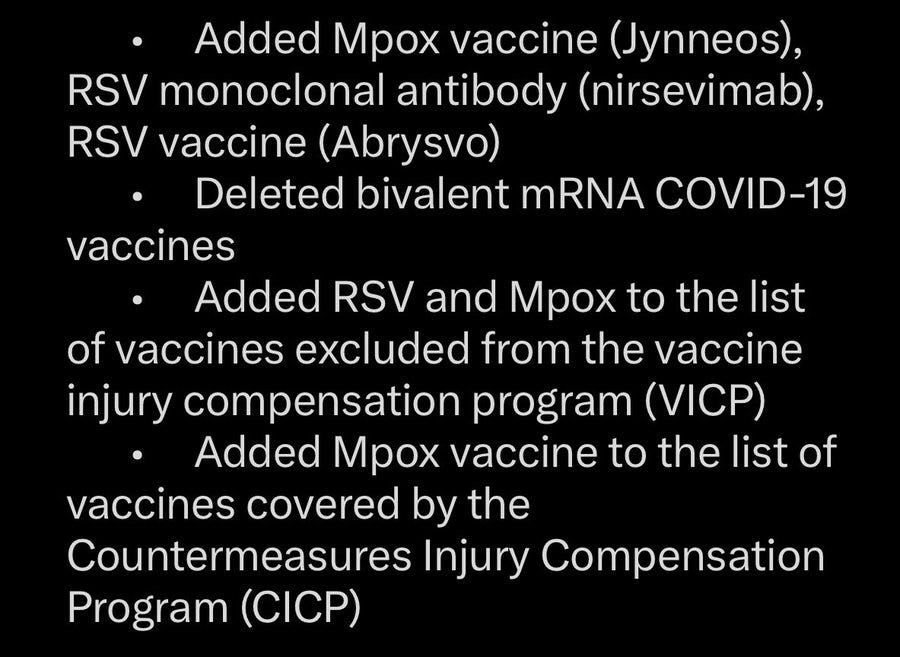Protect Babies from the Injection of Beyfortus (RSV monoclonal)
This is a post from a French colleague Helene Banoun
Here are changes that were made to the CDC childhood vaccination schedule for 2024:
Helene Banoun is a pharmacist-biologist, former INSERM researcher, based in France.
She writes in an email:
Since December 6, when I alerted the public about the French government's uncontrolled clinical trial, Twitter France has made me invisible. In France, the injection of Beyfortus (nirsevimab, a monoclonal antibody against bronchiolitis caused by RSV) is recommended for all newborns from the maternity ward. This treatment has not been tested on newborns, but on children aged between 3 months and 2 years!
French whistleblower calculations demonstrate the existence of a very significant increase in the number of deaths of babies aged two to six days, two months in a row, exactly since the introduction of this “preventive monoclonal therapy against bronchiolitis” (Beyfortus®) which has never really been tested in newborns.
It seems that Twitter has activated the "hide Hélène Banoun's tweets" feature for many subscribers https://twitter.com/BanounHelene
“The unpleasant surprises of RSV bronchiolitis vaccines and preventive therapies.”
by Helene on Researchgate here.
Some excerpts from the paper [numbered references are in the linked paper]:
Monoclonal antibody preventive therapies?
A new concept is emerging in the fight against bronchiolitis: preventive therapy involving direct injection of antibodies. In collaboration with Astra-Zeneca, Sanofi is marketing a monoclonal antibody against RSV, Beyfortus, for preventive injections in newborns. One of the clinical trials [1] showed serious adverse reactions to the vaccine, with 3 deaths in the vaccinated group versus 0 in the placebo group. According to the ritual formula, "deaths are not attributed to the vaccine by the investigator".
The FDA recorded 12 deaths in all trials of this monoclonal antibody [2]: 4 cardiac deaths, 2 gastroenteritis, 2 sudden deaths, 1 cancer, 1 Covid, 1 fracture, 1 pneumonia, but no deaths were linked to treatment.
The EMA recorded 3 deaths in the placebo groups and 11 deaths in the treatment groups. EMA conclusion: the benefit/risk balance is positive...[3].
The HAS (Haute Autorité de Santé, High Health Authority, France) also stresses the absence of any data to support a possible impact on reducing hospitalization times or mortality, and also notes deaths as a possible adverse effect [4].
Let's not forget that this whole bronchiolitis "prevention" campaign is supposed to avoid overcrowding hospitals with babies suffering from this disease: if this product doesn't significantly reduce hospitalizations, what's the point?
In its September 2022 report [3], the EMA reminds us of the fiasco of RSV vaccine trials in the past: children died of severe bronchiolitis in the vaccinated groups and none in the control groups.
This is yet another manifestation of the ADE (antibody-mediated facilitation/aggravation of infection) described for Dengue fever [5]. This ADE is due to the deleterious effect of antibodies which, instead of neutralizing the virus, facilitate its entry into the cell via the receptor of the Fc fragment of immunoglobulins.
And it's precisely this Fc region of Nirsevimab (the generic name for Beyfortus) that industry has seen fit to modify: the Fc of this antibody has a higher affinity for the neonatal Fc receptor, in order to extend its lifespan.
Note - how coincidental! Very similar design approach was taken simultaneously by ALL covid vax manufacturers: select the most toxic component of the target “pathogen” to make it the design element of their product. It appears to be the new-new fashionable trend in drug development. Let’s make it REALLY dangerous.
The EMA reminds us that the role of this Fc fragment in "protection" against the RSV virus cannot be ruled out. As I explained [6], different names are given to the same phenomenon, depending on whether it's considered beneficial (ADCD, ADNKA, ADCP, ADNP) or deleterious (ADE): it's always an entry of the virus into the cell facilitated by the Fc fragment of the antibody. Manufacturers are looking for the beneficial effects of this phenomenon and are wary of deleterious effects, which is why they have investigated the risk of ADE with Beyfortus in animal models. They claim not to have detected it, but the EMA points out, unmoved, that no histopathological evaluation of rats was carried out after treatment and infection with RSV: this is the only recognized marker of ADE.
The EMA reassures us that no signs of ADE have been observed in clinical trials: really? However, bronchiolitis was reported as the cause of death in infants in the treated groups; these deaths were not attributed to the treatment by the investigator. To be able to confirm this, these poor babies would have had to be autopsied and checked for histopathological phenomena in the lungs: this was not done, and the EMA was careful not to ask for it. It is therefore to be feared that this monoclonal antibody, whose Fc fragment has been modified, could cause this dangerous ADE effect in certain infants, which would explain the imbalance in deaths in the treated group compared to placebo, but also the same imbalance compared to the group treated with Synagis (palivizumab), the former equivalent drug which did not have this modification of the Fc fragment [7]!
An article in French press (auto translation to English available) “The Beyfortus train has already derailed.” Shows the following grim statistics:
The blue curve represents, for each month (from 2018 to October 2023), the mortality rates of 2 to 6 days of life, of the native babies of the month in question.
The horizontal green line represents the reference rate, calculated over the years 2018-2019. This rate is 0.69 deaths per 1,000 births.
The blue dotted lines represent the’ confidence interval of the mortality rates at 95 %.
The red dotted lines represent the’ confidence interval of the mortality rates at 99.8 %.
As of September 2023, there are 54 infant deaths between 2 and 6 days of life out of 55,489 births, what gives a mortality rate of 0.97 deaths per 1,000 births.
White House Confirms 230,000 Additional RSV Immunization Doses for Infants Next Month.
France is the world's testing ground for this product, which will now be distributed in the USA! Beyfortus injected into newborns in maternity wards since September 15 50% increase in infant deaths between 2 and 6 days of age. Main adverse effect = bronchiolitis = facilitation of infection by monoclonal antibody.
RSV is a scam:
Let’s also not forget - RSV is a completely made up, non-issue in health. A rebranded common cold that never threatened lives of babies. Please do not fall for this garbage. Do not inject your babies with toxic biological concoctions.
Moerna’s RSV Vaccine has no efficacy (and IMO, none is expected form transfection of cells with genetic material for a made up respiratory virus):
There is a severe risk exposure from transfecting your cells with genetic and other poisons (IMO, “prevention of cases” is a fairy tale made by highly paid statisticians trained in faking it):
Art for today: Sophia and Moomin, oil on linen.









Here's an article from May, 2023 on the dangerous RSV scam. Embedded links at article for those who want more details.
The Race to Save the World from the Common Cold
https://healthfreedomdefense.org/the-race-to-save-the-world-from-the-common-cold/
"The protein-based RSV vaccines are designed to introduce the desired molecule into cells in order to produce an immune response and theoretically train the immune system to recognize a protein on RSV’s surface.
According to GSK, AREXVY “contains a recombinant subunit prefusion RSV F glycoprotein antigen RSVPreF3 combined with GSK’s proprietary AS01E adjuvant.”
The composition of the protein is duly noted in the package insert:
The RSVPreF3 antigen is expressed by culturing genetically engineered Chinese Hamster Ovary cells in media containing no antibiotics or animal-derived proteins. The RSVPreF3 protein is purified by several chromatographic and filtration steps, formulated with excipients, filled into vials, and lyophilized (freeze dried).
...
While the medical industry has been claiming for years that RSV is a childhood disease, GSK itself notes that based on animal models it is “strongly suggested that AREXVY would be unsafe in individuals younger than 2 years of age because of an increased risk of enhanced respiratory disease. AREXVY is not approved for use in persons <60 years of age.”
......
Following on the heels of GSK in the race for a similar vaccine, Pfizer and Moderna have announced their plans to enter the RSV sweepstakes.
Moderna has an RSV mRNA vaccine candidate in the pipeline geared towards older adults while Pfizer’s RSV prospect is said to be targeting older people and pregnant women claiming its product will stop RSV in newborn infants.
...
Similarly, the same data showed that 37.1% of infants whose mothers received the experimental Pfizer vaccine experienced adverse events within one month of birth — with 15.5% classified as “serious,” 4.5% as “severe” and 1% as “life-threatening.”
Despite the numerous violations, scandals and long-standing track records of dangerous products produced by the companies involved, the RSV vaccine gold rush continues at full speed.
Analysts estimate that the RSV vaccine market is positioned to reach $10 billion by the year 2030. In a conference call to investors and analysts GSK stated that it already has “millions of doses” of Arexvy “ready to be shipped.”
If the public wasn’t aware that RSV was a problem in need of a solution that too is in the pipeline as evidenced by infectious disease “expert” Dr. William Schaffner’s recent statement, “We’ll have to educate the population that this virus that not everyone has heard about is actually an important threat to their health in the wintertime.”
One can only imagine what that “education” will look like."
RSV is the new Covid-19.